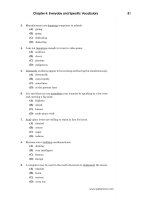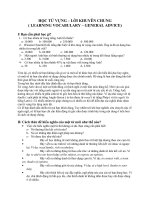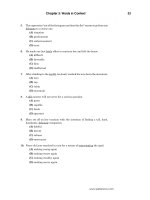Vocabulary general 10 potx
Bạn đang xem bản rút gọn của tài liệu. Xem và tải ngay bản đầy đủ của tài liệu tại đây (60.74 KB, 11 trang )
wash
WASH
In my mother’s Oklahoma dialect, “wash” was pronounced “warsh,” and I was embarrassed to
discover in school that the inclusion of the superfluous “R” sound was considered ignorant. This has
made me all the more sensitive now that I live in Washington to the mispronunciation
“Warshington.” Some people tell you that after you “warsh” you should “wrench” (“rinse” ).
List of errors
file:///C|/Temp/livres/commonerrors/errors/wash.html03/09/2005 15:40:25
way
WAY
FAR, MUCH MORE
Young people frequently use phrases like “way better” to mean “far better” or “very much better.” In formal writing, it would be gauche to say that
Impressionism is “way more popular” than Cubism instead of “much more popular.”
List of errors
file:///C|/Temp/livres/commonerrors/errors/way.html03/09/2005 15:40:25
ways
WAYS
WAY
In some dialects it’s common to say “you’ve got a ways to go before you’ve saved enough to buy a Miata,” but in standard English it’s “a way to go.”
List of errors
file:///C|/Temp/livres/commonerrors/errors/ways.html03/09/2005 15:40:25
weather/wether/whether
WEATHER/WETHER/WHETHER
The climate is made up of “weather”; whether it is nice out depends on whether it is raining or not. A
wether is just a castrated sheep.
List of errors
file:///C|/Temp/livres/commonerrors/errors/weather.html03/09/2005 15:40:25
weather forecast calls for
WEATHER FORECAST CALLS FOR
WEATHER FORECAST PREDICTS
Glendower:
I can call spirits from the vasty deep.
Hotspur:
Why, so can I, or so can any man;
But will they come when you do call for them?
Shakespeare: Henry IV, Part 1
Newspeople constantly joke that the weather service is to blame for the weather, so we shouldn’t be surprised when they tell us that the forecast “calls
for” rain when what they mean is that it “predicts” rain. Remember, wherever you live, the weather is uncalled for.
List of errors
file:///C|/Temp/livres/commonerrors/errors/callsfor.html03/09/2005 15:40:26
Wensday
WENSDAY
WEDNESDAY
Wednesday was named after the Nordic god “Woden” (or “Wotan”). Almost no one pronounces this word’s middle syllable distinctly, but it’s important
to remember the correct spelling in writing.
List of errors
file:///C|/Temp/livres/commonerrors/errors/wensday.html03/09/2005 15:40:26
went
WENT
GONE
The past participle of “go” is “gone” so it’s not “I should have went to the party” but “I should have gone to the party."
List of errors
file:///C|/Temp/livres/commonerrors/errors/went.html03/09/2005 15:40:26
were/where
WERE/WHERE
Sloppy typists frequently leave the H out of “where.” Spelling checkers do not catch this sort of error,
of course, so look for it as you proofread.
List of errors
file:///C|/Temp/livres/commonerrors/errors/were_where.html03/09/2005 15:40:27
wet your appetite
WET YOUR APPETITE
WHET YOUR APPETITE
It is natural to think that something mouth-watering “wets your appetite,” but actually the expression is “whet your appetite"— sharpen your appetite, as
a whetstone sharpens a knife.
List of errors
file:///C|/Temp/livres/commonerrors/errors/wet.html03/09/2005 15:40:27
what
WHAT
THAT
In some dialects it is common to substitute “what” for “that,” as in "You should dance with him what brung you.” This is not standard usage.
List of errors
file:///C|/Temp/livres/commonerrors/errors/what.html03/09/2005 15:40:27
wheat
WHEAT
WHOLE WHEAT
Waiters routinely ask “Wheat or white?” when bread is ordered, but the white bread is also made of wheat. The correct term is “whole wheat,” in which
the whole grain, including the bran and germ, has been used to make the flour. “Whole wheat” does not necessarily imply that no white flour has been
used in the bread; most whole wheat breads incorporate some white flour.
List of errors
file:///C|/Temp/livres/commonerrors/errors/wheat.html03/09/2005 15:40:27









